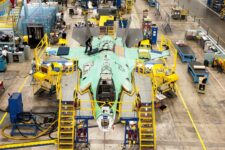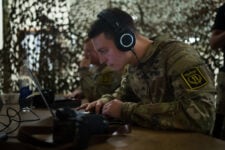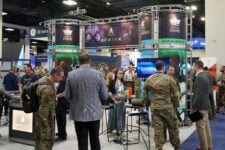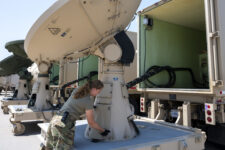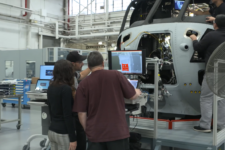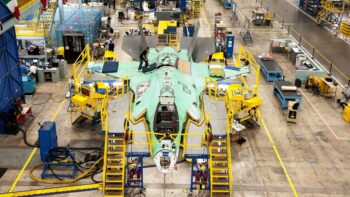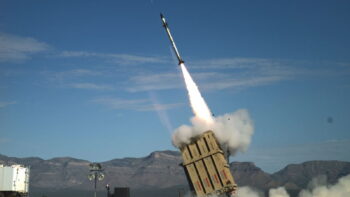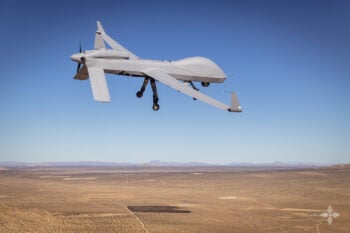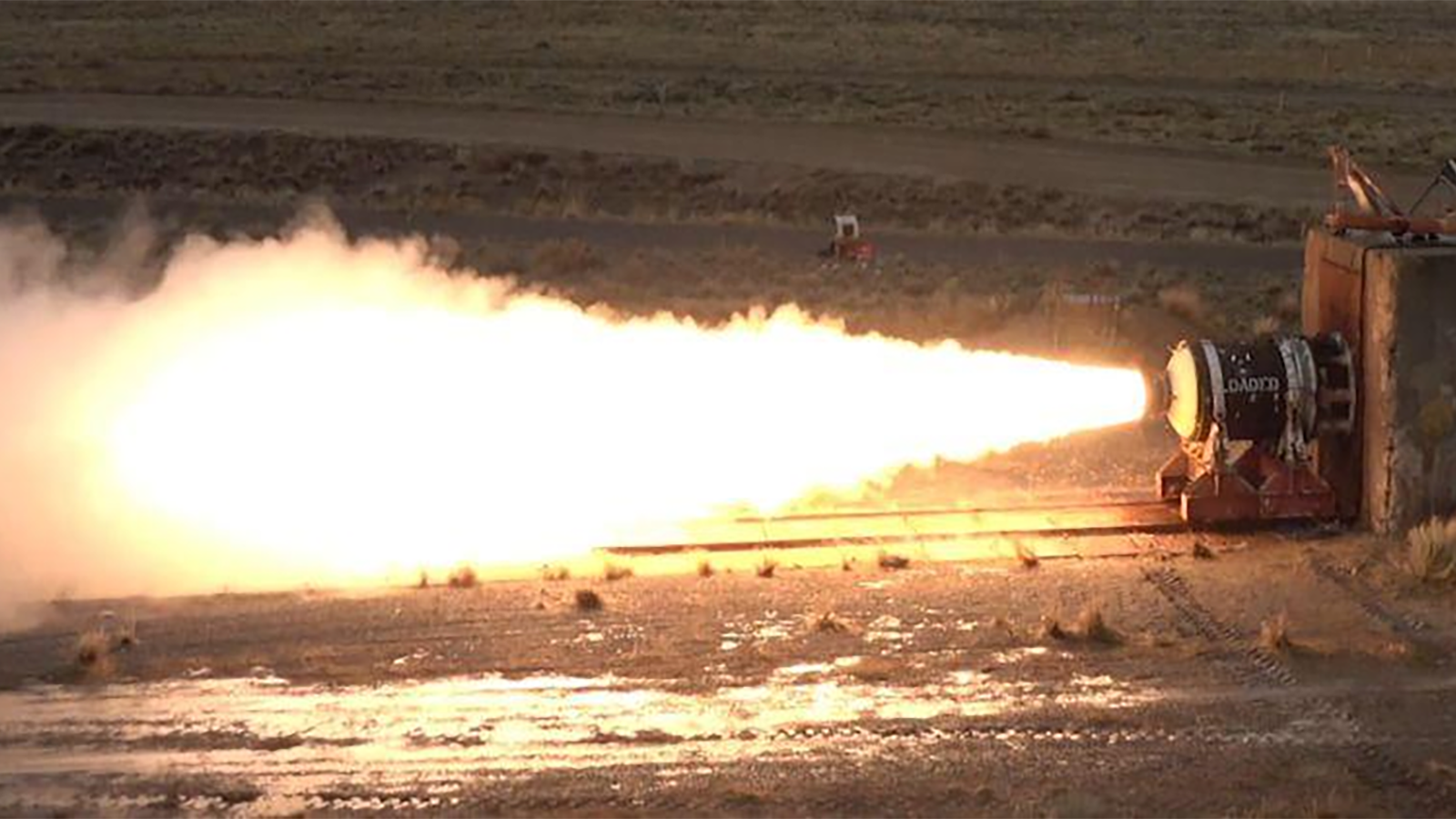
Aerojet Rocketdyne’s successful test of its Missile Components Advanced Technologies Demonstration Motor on May 12, 2020. (Aerojet)
WASHINGTON: The future of Aerojet Rocketdyne appears on shaky ground, with its $4.4 billion merger with Lockheed Martin seemingly dead in the water and a public war brewing among the company’s leadership.
On Tuesday evening, Aerojet announced it had begun an internal investigation into Warren Lichtenstein, who has been the company’s executive chairman since 2016. Earlier that day, SPH Group Holdings LLC — an affiliate of Lichtenstein’s Steel Partners Holdings L.P. — filed documentation to replace four of Aerojet’s existing board members, including CEO and President Eileen Drake.
In a statement, Aerojet called Lichtenstein’s machinations a “disruptive proxy contest” driven by “personal concerns and [a] desire to secure his board position and gain leverage” as the company’s internal probe continues. Lichtenstein’s Steel Partners has rebutted those claims, saying that the new slate of directors would better position a standalone Aerojet, should the Lockheed acquisition fall though.
The internal controversy came just a week after the Federal Trade Commission filed suit to block Lockheed Martin’s planned $4.4 billion acquisition of Aerojet. Lockheed has 30 days following the filing of the lawsuit on Jan. 25 to determine whether to fight or back out of the deal, both options a Lockheed spokesman said on Tuesday that it was still considering.
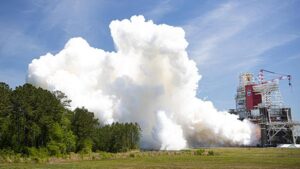
Aerojet Rocketdyne’s RS-68A rocket engine successfully completed its final acceptance test April 12, 2021, on the B-1 test stand at NASA’s Stennis Space Center in Mississippi. (NASA)
But with no public condemnation of the FTC’s complaint from the Defense Department, multiple analysts who spoke to Breaking Defense said that Lockheed will likely cancel the transaction.
That will leave Aerojet to solve its current internal conflict, which boils down to “a tension between investors and innovators” at the company, said Loren Thompson, a defense industry consultant who has worked with both Lockheed and Aerojet.
“The near-term future of Aerojet depends on which faction within the company succeeds in asserting control,” Thompson said. But ultimately, he added, the long-term future of the company will be contingent on finding a new buyer “with big pockets.”
The big question is, who else might be in the market?
At Aerojet, Battle Lines Are Drawn
At its core, the fracture in Aerojet leadership appears to be a divide between Drake, a former US Army aviator who rose up the ranks of the defense industry, and Lichtenstein, a private equity investor whose holding company owns 4.9% of Aerojet.
In a statement, Steel Partners said that its slate of proposed directors was “assembled to help the company thrive if it needs to pursue a standalone future” after the potential dissolution of a Lockheed buy.
However, Aerojet suspects that Lichtenstein intends to “clean house” — evicting Drake and her allies and installing a board that will position Aerojet for a private equity takeover, a source with knowledge of the situation told Breaking Defense.

Aerojet’s advanced manufacturing facility in Huntsville, Ala. (Aerojet Rocketdyne)
A further source of the dispute is the investigation itself, which Steel Partners characterized as retaliation against Lichtenstein due to continued disagreements with Drake.
“We question the motivation and timing behind the disclosure of an internal investigation into a conflict between Mr. Lichtenstein and Ms. Drake, which the company’s own general counsel described two days ago as ‘innocuous,’” Steel Partners said in a statement.
Aerojet noted in a statement that the investigation was unrelated to the company’s operations or financial reporting. An Aerojet spokeswoman, when contacted by Breaking Defense, declined to give further details. (The source with knowledge of the situation said that the investigation was launched prior to Steel Partners announcing their proposed slate of directors.)
In the end, the future of Aerojet will rest on the results of the investigation and the upcoming shareholders meeting. If Lichtenstein is able to install new leadership, the direction of the company could change dramatically, according to Thompson.
“The only reason why Lockheed Martin was willing to offer over $4 billion for an enterprise that has annual revenues of $2 billion is because of the potential functional synergies,” Thompson said. “It appears there’s nobody else on the horizon that has the rationale for paying that kind of money.”
Aerojet has traditionally structured itself as an engineering company with high fixed costs and low margins, Thompson said. But if private equity buys the company, it will want to see more robust financial returns, which could come at the cost of innovation.
“This really comes down to whether the financial interests or the engineering interests within Aerojet prevail in the struggle,” he said. “My heart is with the engineering interests. My brain, which knows the history of these types of struggles, assumes the financial interests will ultimately prevail.”
FTC Unanimity, Pentagon Silence Don’t Bode Well For Lockheed Deal: Analysts
After the FTC filed late last month to stop the Lockheed-Aerojet deal, analysts said not only the suit itself, but how the suit was decided and announced, signaled it would be difficult to salvage the merger.
The FTC’s move “puts Lockheed management in a tough position, because pushing back and fighting the government — the FTC — in court … it takes a lot of time and resources,” said Roman Schweizer, a defense analyst with Cowen Washington Research Group.
Seth Seifman of J.P. Morgan pointed to the FTC’s unanimous 4-0 vote in favor of blocking the deal, which means that the case against the deal was enough to convince the commission’s Republican members.
“If DoD was willing to really stand up for the deal, then I would imagine that maybe there would have been more opposition from the Republicans on the commission,” he said. “But because there wasn’t, it seems like maybe DoD either was fairly indifferent, or didn’t want to spend time … on this.”
In its suit, the FTC argues that Lockheed competes against other major defense primes like Boeing, Northrop Grumman and Raytheon to build missiles, missile interceptors and hypersonic weapons — and that Aerojet is, in some cases, the sole provider of critical propulsion systems required to develop those technologies.
If Lockheed were to acquire Aerojet, the FTC believes Lockheed could disadvantage its competitors by raising prices, impacting schedules or reducing the quality of other companies’ engineering teams.
In fact, its complaint alleges that Lockheed has already “sought unsuccessfully to prevent Aerojet from supplying critical propulsion technologies to other prime contractors on a number of occasions.” Though the explanation of the event is redacted, the FTC states that “this is not the first time Lockheed made such an attempt.”
RELATED: Lockheed buying Aerojet is bad for defense
The Defense Department, which provided the FTC the results of its independent review, has remained silent on the issue. Pentagon Press Secretary John Kirby told reporters last week that the department would not publicly discuss its position unless the FTC disclosed it first. (The FTC, in the public version of its complaint, redacted all references to the results of the Pentagon review.)
Byron Callan, an aerospace and defense analyst at Capital Alpha Partners, said that situations indicates a certain synergy between the FTC and the DoD on the issue, which would be a “stoplight” for Lockheed Martin.
To Lockheed, “it says that [the] FTC really worked very closely with the DoD. And so don’t think that you’re going to end run us or get a lot of support from the DoD, if you think you can contest this in court.”
A Shift In The Political Sands
The potential dissolution of the Lockheed-Aerojet deal signals a new wave of antitrust concerns that came in with the Biden administration and appears reflected in the Pentagon, analysts said.
Lockheed’s planned merger with Aerojet comes after two major acquisitions by defense industry juggernauts: Raytheon’s acquisition of United Technologies Corp. in 2020 and Northrop Grumman’s 2018 acquisition of Orbital ATK. The Northrop-Orbital merger in particular bears similarities to the proposed Lockheed-Aerojet deal, as Orbital also specializes in solid rocket motors, scramjets and other critical propulsion systems.
However, both the Raytheon-UTC and Northrop-Orbital mergers occurred under the Trump administration, and analysts said that the Biden administration’s skepticism of the defense industry — coupled with a more aggressive FTC — may have stifled Lockheed’s prospects.
“Certainly things have changed. [It’s] certainly a different administration, admittedly a different FTC with a different view on consolidation, not only in defense, but in other industries,” said Schweizer.
“Maybe Lockheed could have gotten this in under the wire in the first half of 2021,” Callan said. “But the more it got delayed and the more you had this changeover in DoD personnel, that probably argued against it.”
While the FTC’s decision sends a strong signal that the Biden administration will be looking more closely at proposed consolidation in the defense sector, analysts said the FTC’s complaints against the Lockheed-Aerojet merger are unique due to Aerojet’s status as the only independent US manufacturer of solid rocket motors and Lockheed’s standing as the world’s largest defense company.
“I don’t think that this puts defense M&A [mergers and acquisitions] into the icebox for a while,” Callan said. “On the contrary, I think you’ll continue to see a decent pace of deals progress.”
Before news broke about the internal rift at Aerojet, Schweizer and Callan told Breaking Defense that some other entity — perhaps private equity or a smaller defense prime — could swoop in and attempt to buy Aerojet instead.
“I think there’s probably another potential buyer out there, as long as they’re not named Northrop, Raytheon, Lockheed or Boeing,” Schweizer said.
Callan listed BAE Systems, L3 Harris and Leidos as three defense firms that might be able to acquire Aerojet without triggering the concerns posed by Lockheed.
But Aerojet will likely have to resolve its leadership crisis before it establishes a new buyer, Thompson said.
“This is going to be a murky situation for a while,” he said.
Lockheed, Howmet settle lawsuit over F-35 titanium (EXCLUSIVE)
Lockheed Martin alleged in court filings that Howmet cut off the supply of titanium after the aerospace giant refused to agree to higher prices, threatening production of the F-35.
